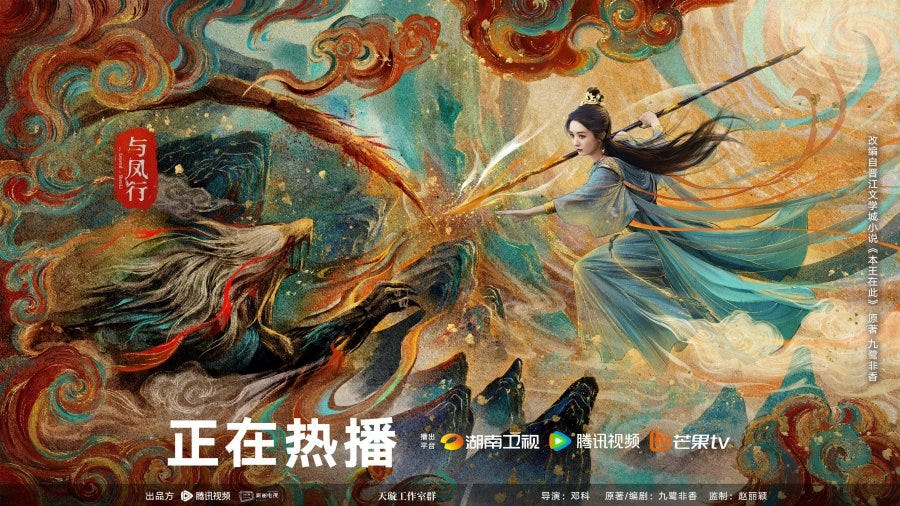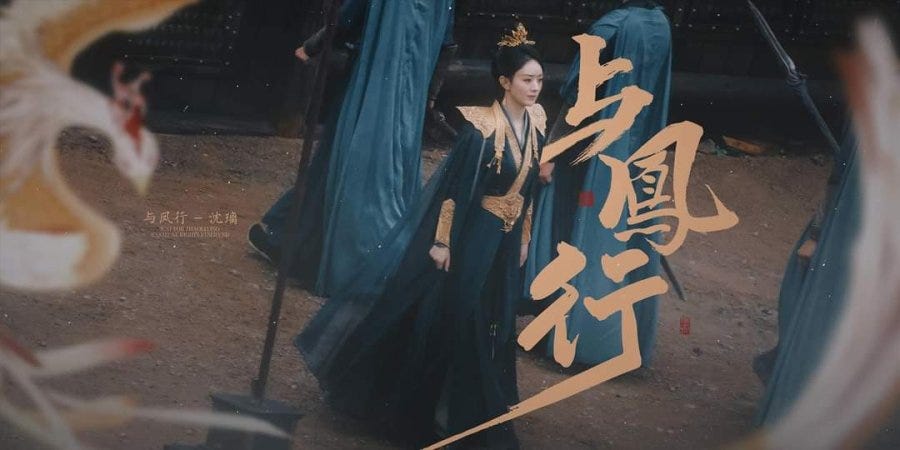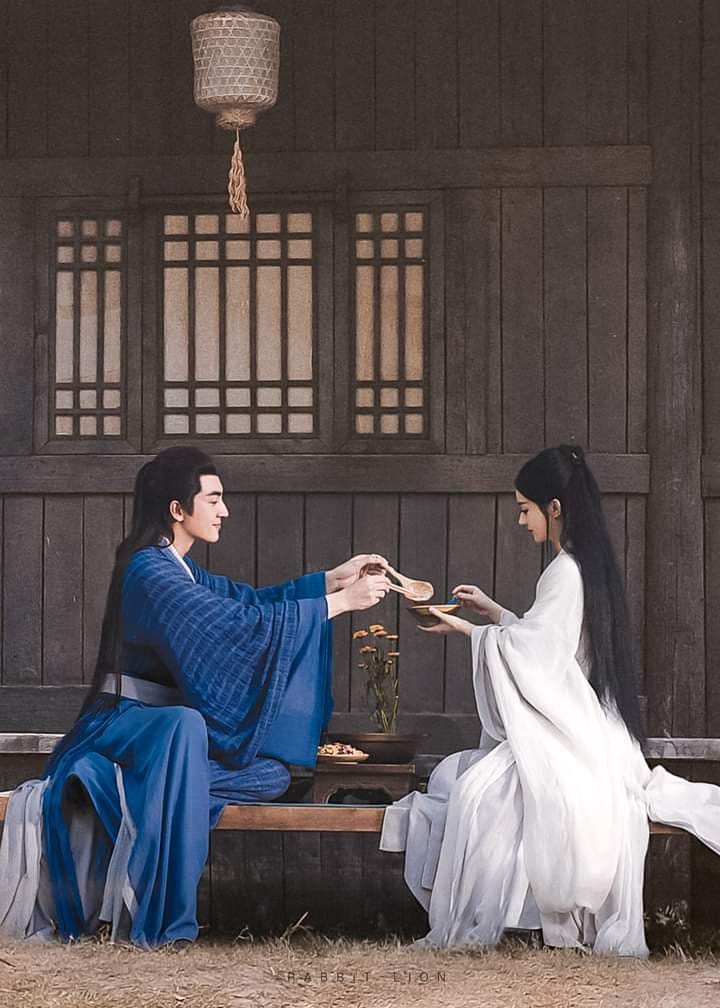I will begin by putting my cards on the table. If it weren’t for the fact that I’m still moderately sour about the non-completion of Princess Agents, it’s unlikely I would even give the show a look. I don’t have problems with fantasy stories or even ones with ghosts and monsters but I’m inexplicably allergic to xian xia. I have tried in the past but these experiments often end badly. And frankly the world will continue to spin even if I don’t watch C dramas featuring immortals misbehaving like mere mortals. Or deities trying to outdo humans in idiocy. It’s like reading the Iliad. It portends hours of frustration. Maybe it’s because I hold “gods” to a higher standard but in these stories they’re inevitably just well-endowed people with superpowers. As is the case when making gods in man’s image.
So after a 7-year will-they-won’t-they situation, the Princess Agents leads are back together. Not in a sequel sadly (Thankfully I never held my breath for that) but in a fantasy drama about immortals falling in love. Ugh. But for Lin Gengxin I will try anything within reason. And in this instance… I’m rather glad I did.
Like many short C dramas that I’ve been watching lately, the Legend of Shen Li begins boisterously with an unwanted marriage deal: A marriage to maintain an alliance between the “Divine” realm and the “Immortal” realm. The titular lady at the centre of this (Zhao Liying) wants none of it and so an almighty battle ensues in the earth’s stratosphere while humans enjoy fireworks during a festive season. To save her from a fate worse than death, her subordinate Mo Fang (Xin Yunlai) sends her flying down to earth where she transforms into a fine specimen of poultry. She’s caught and sold to Xing Yun (Lin Gengxin), a sickly and inscrutable young man who helps her regain her godlike abilities with good food. Much of the humour in those first two episodes sees Xing Yun interacting with a cantankerous CGI bird who is mostly peeved about not having the creature comforts she’d been accustomed to. While Shen Li, the Lord Bianci is a known quantity, Xing Yun is the enigma. To the townsfolk he is an eccentric recluse with divination skills decocting medicines as a matter of habit.
Soon Shen Li is able to return to her original humanoid form and her curiosity leads her to investigate two cases while she traverses the mortal realm with Xing Yun as her de facto guide. The first sees an allegedly unstable peasant waiting the return of her husband who went to the battlefield some 15 years earlier. The second “case” features the second most powerful man in the city who is keeping his comatosed wife alive in a secret chamber while cozying up to a demoness on the side. What these stories have in common is the theme of letting go. Human beings for one reason or another have difficulty letting go. Whether it’s death or love, saying goodbye and moving on is difficult. This is particularly compelling in the story of demoness. The demoness has the fingerprints of Hans Christian Andersen’s The Little Mermaid from head to toe even if she’s not a direct allusion. Her place of refuge is the large lily pond in her master’s mansion. Shen Li holds her up as an example of the tragic outsider, a fish out of water, an impossible love who loved another too deeply to her detriment — he didn’t deserve her. He was using her. But from her point of view, like the tragic mermaid in Andersen’s tale she made the ultimate sacrifice for love. Not all love ends in a happily-ever-after. Not all love is reciprocated. Her expectations are never met. From another perspective, while the demoness’ master might be using her, others might see him as a devoted husband in terms of what he’s willing to do to keep his wife alive. Still others might see him as selfish — perhaps he should let his wife go and end her suffering once for all. From his perspective he is doing whatever is necessary to fulfill his spousal obligations — to protect his wife to the end especially when used herself as a shield to protect him. So where should the lines be drawn? Good stories present different points of view or multiple possibilities to provoke thinking and discussion. In the case of the soldier’s wife, devotion has a trade off — the woman’s sanity and longevity. Stay or leave, there’s a cost that has to be paid. Death comes to all sooner or later. So it begs the question — so who has the right to choose who lives or dies?
When it’s time for Shen Li to shuffle off the mortal realm back to where she belongs, she knows she can’t be with Xing Yun a man whose days are numbered compared to hers and accepts the reality that such a relationship is “impossible”. So she makes plans to leave but ensures his safety before departing. Similarly her subordinate Mo Fang is obviously in love with her and has been for a while. His protective instincts emerge whenever she’s in jeopardy. She doesn’t find herself obligated to return the favour when he finally confesses. Instead she commands him to put all such thoughts out of his mind. It is impossible, she tells him. The audience might feel bad for him. He has loved for so long. He has no qualms putting himself between the enemy and her. Doesn’t a man like that “deserve” the love of a strong woman? This obviously opens up yet another can of worms? Is she then obligated to reciprocate just because he would risk life and limb for her? Are his motivations alone a "sufficient” enough reason for her to change the dynamic of their relationship? Is love explicable by debt or “keeping accounts”?
Although the window dressing is ancient Chinese, the sensibility is arguably modern and western. And I’m not talking about the seeming role reversals. There are elements of Lord of the Rings — Lin Gengxin can pass off for a Tolkien elf with ease as he presents a serene nonchalance with a perceptible streak of mischief. The chimeric creature that threatens the spiritual realm, the chimei, a demon spirit has the face of a wolf and wolves are commonplace in western folklore as representations of danger. Red Riding Hood and little pigs get eaten by wolves for their naivete. Wolves wander the landscape of Aesop’s fables as a lurking evil that must be repelled. His best known “The Boy Who Cried Wolf” demonstrates that repeated deception leads to diminished trust. When the wolf finally makes an appearance, evil wins the day. In the Bible wolves are the predators (false teachers) among the flock (believers). They use their cunning to deceive and then devour their prey. It is also suggestive that Shen Li’s chimei can take on human form.
When the leads reunite and Xing Yun returns as the only ancient one remaining, Xing Zhi, he pretends not to be acquainted with her. In contrast with Mo Fang’s halting confession, Xing Zhi denies knowing Shen Li without batting an eyelash. Why? That’s the mystery that must be discovered later. Perhaps it has something to do with the fact that he’s the only one of his kind left.
The first six episodes has the best set-up I’ve seen in a C drama in recent times. A Journey to Love would be a good close second. The characters, world-building and motivations are established early with humour and wit. So far this is a good script that can stand on its own even without the Princess Agents leads. While xian xia is really not my thing, I’m not averse to a good fantasy that includes monsters of various stripes. The first two episodes when Shen Li is in her birdlike from are a hoot. Her frustrated posture partnered with his affected indifference are an entertaining combination. Their banter sparkles in that idyllic abode by the river. The jokes are good and the universe they inhabit exudes a fun vibe. There’s a sense that the show doesn’t take itself too seriously. A wink here and a nudge there to remind us that this is a world that might function with different rules but the characters that inhabit it are not that different from us mere mortals.
If you enjoyed this post, please like subscribe or leave a comment. You can also send me a private message.
Would you consider supporting the maintenance of the blog? Please go to this link and you can buy me a hot drink or a book. Thanks for reading as always.






Princess agents season 2
I'm one of the fools still hoping for a "Princess Agents" sequel, lol. I feel like some of these scenes were little nods to their PA roles, like when ShenLi waits on him. I just love their dynamic. With xianxia, I'm always nervous about the CGI. I thought they did an excellent job with the chicken, but I found some of the opening battle scenes a bit cringe worthy. Hoping the future fight scenes will have better effects.